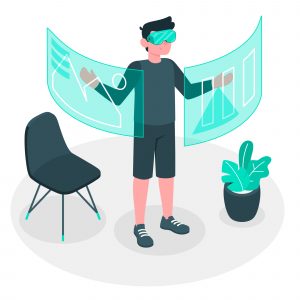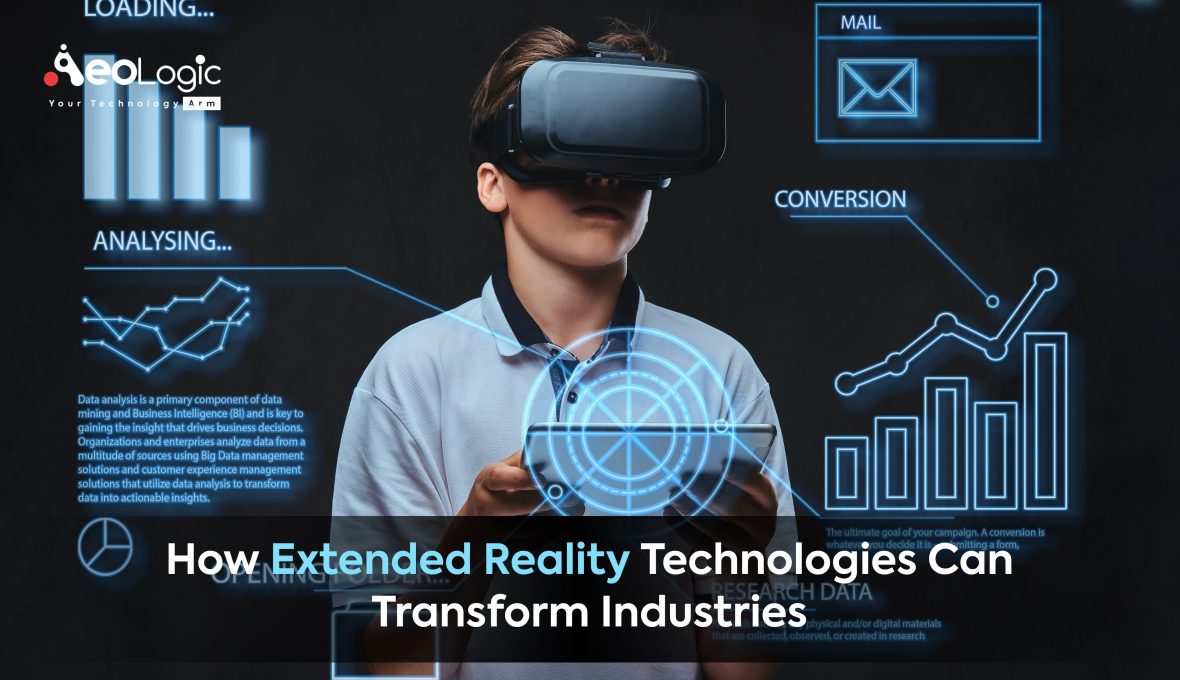Ever wondered about the capabilities of Extended Reality Technologies? If you have, then you’re in the right place. If you haven’t, I’m glad you’re here, because this tech is causing ripples in various sectors.
Key Takeaways
- XR, comprising AR, VR, and MR, is set to transform various industries, including education, retail, healthcare, real estate, and manufacturing.
- As indicated by the projected increase in AR/VR spending to approximately $160 billion by 2023, XR technologies are a crucial part of our future.
- The benefits of XR are manifold, ranging from enhanced customer experiences and increased efficiency to cost reductions and innovation.
- With over half of new enterprise applications predicted to have embedded AR/VR capabilities by 2024, we’re stepping into an era shaped by XR.
So, whether you’re a business owner looking to innovate, a tech enthusiast staying ahead of the curve, or just someone intrigued by new technology, it’s high time to delve into the world of Extended Reality Technologies. The future is here, and it’s incredibly exciting.
What is Extended Reality (XR)?

Before diving into the topic, let’s quickly define what we mean by Extended Reality Technologies. Extended Reality (XR) is a broad term that encapsulates Augmented Reality (AR), Virtual Reality (VR), and Mixed Reality (MR). It’s like a Pandora’s Box that opens up a new realm, where the physical and digital worlds merge to create an immersive experience.
Learn about New Tech Updates: How Spatial Computing is Changing the Way We Live and Work
The Impending XR Revolution: A Quick Snapshot
According to the International Data Corporation (IDC), global spending on AR/VR is expected to reach approximately $160 billion by 2023, a significant leap from $16.8 billion in 2019. This clearly signifies that Extended Reality Technologies are not merely buzzwords. They are the future.
Statistics Source: International Data Corporation (IDC)
Industrial Transformations Enabled by Extended Reality Technologies
As we venture further into the digital era, XR is playing a pivotal role in reshaping a wide array of industries. Let’s dive deep and explore how these futuristic technologies are revolutionizing various sectors and creating a whole new world of possibilities.
1. Enhancing Education and Training
Traditionally, training often involved hefty manuals or long, drawn-out lectures. With XR, we can transform this passive learning into an interactive, immersive experience. Imagine learning about the solar system by virtually walking on Mars or mastering a surgical procedure with a life-like simulation. Sounds exciting, doesn’t it?
Imagine a shift from passive learning to an engaging, interactive experience. XR makes this possible. Here’s how:
- It allows students to learn complex concepts through life-like simulations.
- It offers the opportunity to explore different environments, from the deep sea to the farthest galaxies.
- It provides professionals with immersive training that replicates real-world scenarios.
2. Revolutionizing Retail and E-Commerce
Ever wished you could try on clothes or check how a sofa fits in your living room while shopping online? Thanks to XR Technologies, this is now a reality. Retailers are integrating XR to provide customers with an in-store shopping experience at home, thereby increasing customer satisfaction and boosting sales.
With XR, the retail industry can leap beyond the screen, providing an enhanced shopping experience:
- Customers can virtually try on clothes, reducing the hassle of returns and exchanges.
- Furniture shoppers can visualize how different pieces would fit and look in their space.
- Retailers can provide virtual store tours, bringing the in-store experience to the comfort of customers’ homes.
3. Reinventing Healthcare
From assisting in complex surgeries to providing therapy for various conditions, XR is dramatically changing the healthcare landscape. Surgeons can practice procedures in a risk-free environment while patients can benefit from VR therapy to overcome fears, phobias, and even pain.
XR is playing an increasingly critical role in healthcare, from training to treatment:
- Surgeons can practice intricate procedures in risk-free, simulated environments.
- Patients can utilize VR therapy to overcome a variety of conditions, from phobias to chronic pain.
- Healthcare professionals can use AR to visualize complex patient cases.
Also Read: Why Energy Monitoring Systems Are a Game Changer for Business
4. Redefining Real Estate
Buying property, whether for personal use or investment, is a significant decision. XR can provide a virtual tour of the property, allowing you to inspect every nook and corner without physically being there. This not only saves time but also offers a more comprehensive understanding of the property.
XR is making property buying more interactive and less time-consuming:
- Buyers can take virtual tours of properties, inspecting every detail without being physically present.
- Real estate agents can showcase properties to potential buyers globally, broadening their client base.
- Architects and designers can use XR to visualize projects during the design phase.
5. Transforming Manufacturing
XR can bridge the gap between design and production, providing engineers with the tools to visualize, design, and modify products in a virtual environment. This increases efficiency, reduces production costs, and fosters innovation.
XR can make the manufacturing process more efficient and cost-effective:
- Engineers can visualize, design, and modify products in a virtual environment.
- Workers can receive hands-on training without the risk of damaging equipment.
- Quality control can be enhanced with AR visual inspections.
Also Read: Transform Your Business with Customized Technology Solutions
The Future of Extended Reality Technologies

The potential of XR Technologies is vast and untapped. In the future, we can expect these technologies to evolve, become more sophisticated, and deeply integrated into our daily lives.
While the transformation won’t happen overnight, the wheels are already in motion. IDC predicts that by 2024, over 50% of new enterprise applications will include embedded AR/VR capabilities, a clear indication of the technological revolution on the horizon.
Final Words
Extended Reality Technologies represent a seismic shift in how we interact with the world. They are not just the future they’re already beginning to shape our present. From education and healthcare to retail and real estate, these technologies are transforming how industries operate. The time to explore and embrace XR is now, as we stand on the brink of an immersive revolution that will redefine our experiences. It’s indeed an exciting time to be alive.
As we delve deeper into the XR era, we at Aeologic Technologies are committed to staying at the forefront of this exciting revolution. We’re passionate about using Extended Reality Technologies to design innovative solutions that help businesses transform and thrive in this digital age. Connect with us, and let’s explore the endless possibilities of XR together!
Frequently Asked Questions
Where are Extended Reality Technologies being used?
XR technologies are already revolutionizing sectors like education, healthcare, retail, real estate, and manufacturing.
Can small businesses afford Extended Reality Technologies?
Yes, as XR evolves, it’s becoming more affordable and scalable, offering high returns on investment, and making it accessible for businesses of all sizes.






